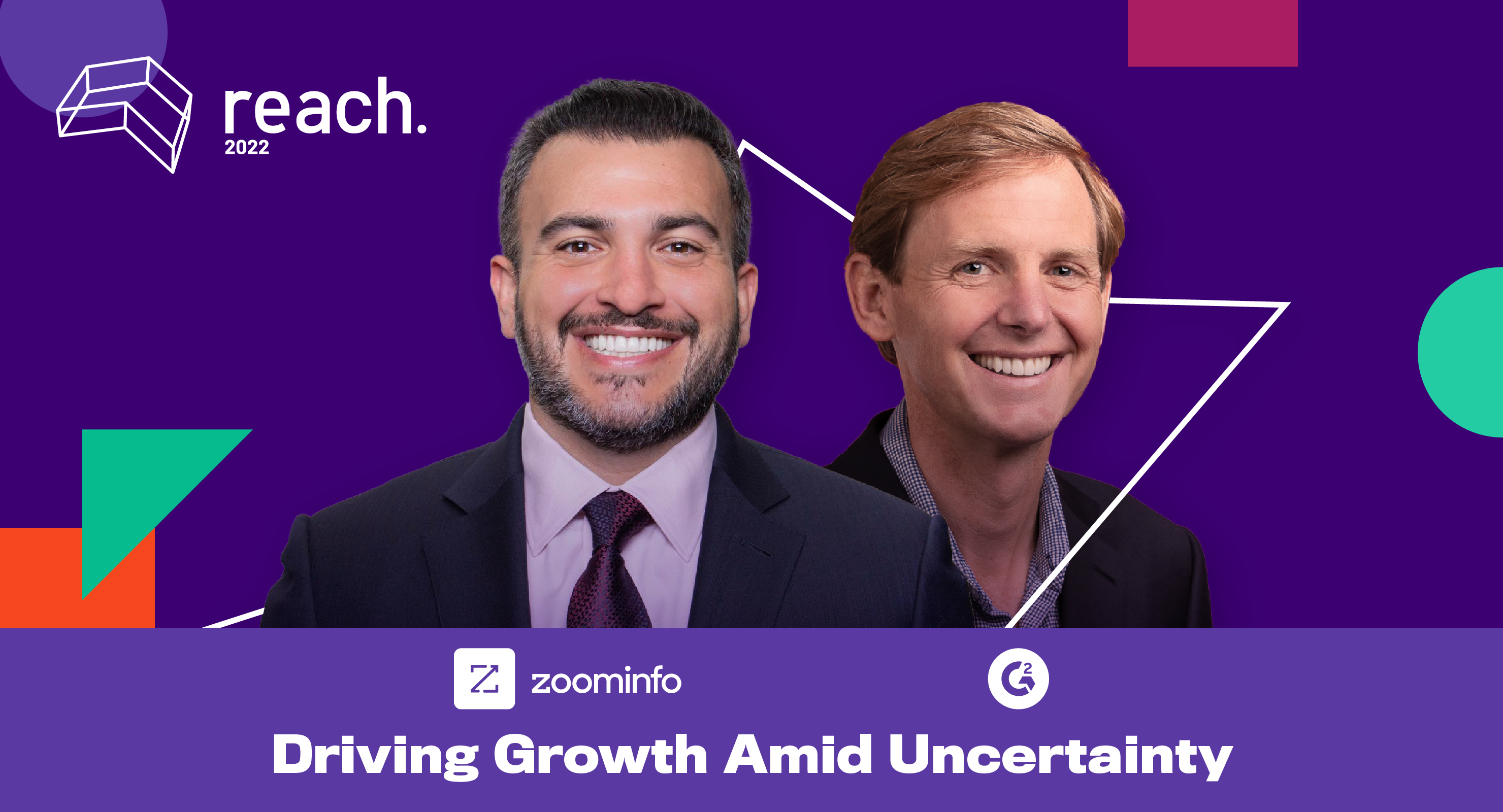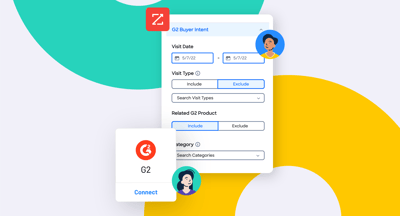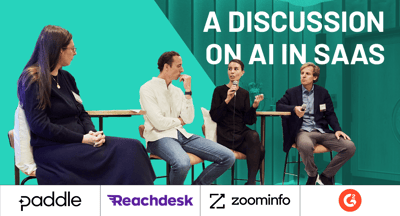December 8, 2022
 by Godard Abel / December 8, 2022
by Godard Abel / December 8, 2022

During our keynote session of G2 Reach 2022, I was excited to interview Henry Schuck, to discuss the company’s journey, his leadership lessons, and the possibility of growth, even during a downturn.
The pandemic brought unique challenges for different industries, and ZoomInfo was no exception. When this data and software company planned to go public on March 26th, 2020, how could they have known that would be just a day after COVID-19 would shut down the entire world?
With businesses closing and unemployment skyrocketing, ZoomInfo powered ahead with an initial public offering (IPO) and made the largest public debut by a tech company in 2020. But how did they do it?
Here are some key lessons Henry shared during our interview (and you can watch the full session on demand).
It’s difficult not to feel stuck when you have to plant the roots of your new business during a financial crisis. About 15 years ago, Schuck was in a similar situation that changed his life dramatically.
Remembering the origins of ZoomInfo (established as DiscoverOrg at the time), Schuck recalls how starting as a small company amid a recession was more promising than being an established firm used to tremendous growth.
Aside from being judicious in their spending, two main factors fueled the success of ZoomInfo from the get-go: an incredible market fit and smart prioritization decisions. Both of these factors are still pivotal in today’s business environment.
From our first #G2Reach22 fireside chat with @godardabel & @HenryLSchuck – Here is Henry's advice on how to successfully grow & scale a #SaaS business. pic.twitter.com/7P6vk4LZnv
— G2 (@G2dotcom) December 1, 2022
When it started staking out audiences in 2007, ZoomInfo understood that its product served a specific niche: technology, sales, and marketing professionals. Leadership knew exactly which companies to target, what those businesses cared about, and how they correlated to Zoominfo’s product.
As a result, there wasn’t any pushback on the product. They had the right market fit and reached out to the right people at companies that belonged to their ideal customer market. These marketers understood how the product would drive growth and efficiency for their business. And ZoomInfo continued to invest in those areas from both a product and marketing perspective.
Schuck talked about how in every crisis, some industries will be slightly less affected than others. Instead of pushing a rock up a hill, it’s wiser to target a nascent segment and put more effort there. Ultimately, businesses must find products that drive efficiency for the customers during a downturn and lead to mutual growth.
$50k split on two credit cards - that’s what it took to fund a dream. In 2007, Schuck recognized that no one in Columbus, Ohio, had any concept of a venture capital funding market. He had no choice but to aim to build a profitable and efficient business from day one.
When the $50k credit ran out, Schuck and his team focused on reinvesting their earnings into the business. And that’s how ZoomInfo grew for the first seven years, up to $30 million in annual recurring revenue.
When asked about the beginning of building their product, Schuck explained that their approach was straightforward – seek out the decision-makers. No platforms like LinkedIn or ZoomInfo existed, and no places to find the CEOs or VPs of different companies. Back then, who you knew was much more valuable than what you knew.
Over the years, that value has changed. Now, it's all about what you know. Your success is defined by how you market and position yourself. In today's industry, digital technology and data-driven culture are implemented to level the playing field.
According to Nick Mehta, CEO of Gainsight, running an efficient software business is a lot like learning a sport when you are young; once you learn the skill at an early stage, it will come easy to you for the rest of your life. Schuck believes that was one of the advantages of the culture they built at ZoomInfo.
When you target efficiency and profitability from day one, you instill those values in your company’s DNA. Companies that start well will continue doing well only if they stay true to what they built. Schuck calls this “manifesting the owner mentality.”
Every employee at ZoomInfo is empowered to think like the company's owner, creating a healthy culture celebrated for seeking solutions. The wins aren't limited to signing new customers but also include applauding a team's efficiency and strategies for maximizing resources.
As you hire more people and expand your company, you cultivate the owner mentality by:
ZoomInfo, a company that started in a 1,000-square-foot loft, was ready to celebrate taking their business public in March 2020. But things began to look a lot different when COVID-19 was declared a global pandemic, followed closely by a national emergency in the US.
How did they re-open the markets successfully in June 2020 after the COVID freeze? Three words – passion for data.
By the end of March, ZoomInfo recognized that adopting digital tools was becoming essential to surviving the pandemic. Most small businesses still lacked the resources that enabled team collaboration to assist remote work.
As the world came to a halt, the company banked on this as an opportunity to look back and focus on lining things up perfectly. They had the right people and processes, and their go-to-market organization was set up for success.
On June 4th, 2020, ZoomInfo opened the market back up, and as they say, the rest is history. This debut was followed by a great year and a half for technology companies going public. Schuck pointed out that ZoomInfo has expanded three times its size since its IPO regarding employees, revenue, and profitability.
is the year-over-year growth of ZoomInfo, earning a revenue worth $287.6 million in the third quarter of 2022.
Source: ZoomInfo
Of course, Schuck doesn't believe they're immune to what's happening in the macro environment, which is why they are more thoughtful about the investments they make in their marketing and the focus they put on segments that are still growing.
When asked for advice for marketing teams dealing with the current economic climate, when people in the tech industry are more reluctant to spend money, Schuck shared how marketers have a tremendous amount of data at their fingertips today. He advises using that data to come together and be in front of the right people at the right time with the right message.
10 years ago, accessing this kind of data was impossible. But today, we cannot deny the power of buyer intent data. You can do everything from sending marketing automation emails to running display ads on social media.
The G2+ZoomInfo integration is a game changer for sales and marketing teams, making it possible to find, engage, and convert the ideal buyer by running targeted campaigns.
He says, "As a marketer in 2022-23, you must deliver on this vision. Bring together these data insights with technologies in your stack and run an integrated, orchestrated motion that lets you conduct targeted messaging like nobody else.”
During the closing segment, I asked, "What would be the one piece of advice you'll give to those of us trying to build a business?"
Schuck's most significant lesson has been to be a great developer of people, regardless of the business size. He pointed out that hiring the best salesperson or top executive wouldn’t always be possible. Instead, the focus should be on hiring people you can help grow. Expanding existing talent is the key to success in running a great business.
"I think that's our responsibility as leaders, getting people in and focusing on how we can grow them. I should have done more of that along the way", he added.
As we think about the software landscape of upcoming years, many areas need more thoughtfulness, like how we set targets or think about our next best customer. And thanks to the power of intent data, it’s an exciting time to be a tech marketer.
With all this data, you can examine business professionals' intellect and uncover their challenges, strengths, and needs. And sometimes, that’s all you need to reach your next business opportunity.
Ready to bring your business to the next level? Learn how to market smarter with buyer intent data and find your ideal customer, even in difficult times.
Godard Abel is the co-founder and CEO of G2. He previously built cloud CPQ pioneers BigMachines (acquired by Oracle) and SteelBrick (acquired by Salesforce).
You can either drown or rise above to ride the waves.
.jpg) by Aayushi Sanghavi
by Aayushi Sanghavi
When it comes to data, less is more, right?
 by Stephen Hoops
by Stephen Hoops
After sharing my reflections on the global opportunity for SaaS innovators in the age of AI, I...
 by Godard Abel
by Godard Abel
You can either drown or rise above to ride the waves.
.jpg) by Aayushi Sanghavi
by Aayushi Sanghavi
When it comes to data, less is more, right?
 by Stephen Hoops
by Stephen Hoops


